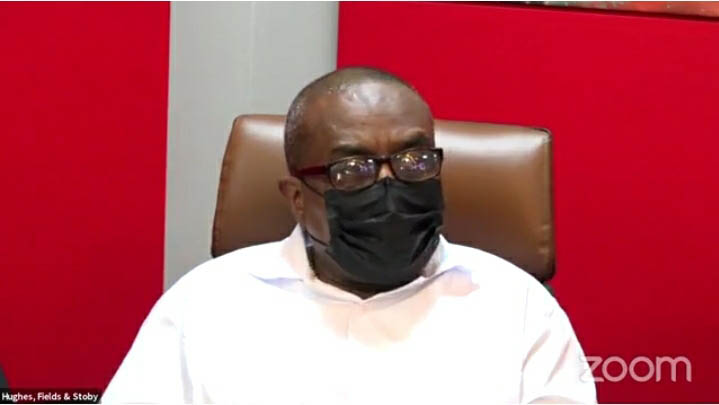Former Police Sergeant Colin Bailey, who after spending six years behind bars was released following an admission from the prosecution at his trial that it never had any evidence linking him to the murder of his reputed wife of 21 years has vowed to sue the State.
He underscored the years stripped of his liberty, damage to his character and distress.
The former Sergeant during a press conference yesterday from the office of his attorney Nigel Hughes, spoke out about what he described as the deplorable conditions of prison facilities and his will to survive and defend himself against inmates he had once been in-charge of as a cop.
To this end, the former-accused supported the calls of attorneys Konyo Sandiford and Ronald Daniels who were part of his legal team headed by Hughes, for the establishment of a Commission of Inquiry (COI) into the operations of the prosecutorial arm of the State.
Referencing the observation by Justice Jo-Ann Barlow who discharged Bailey, that his is not the first such case with which the Courts have been confronted in recent months, the lawyers said that the “incarceration, detention and prosecution” of accused persons following advice from the office of the Director of Public Prosecutions (DPP) needs to be urgently looked at.
Following the murder of Sirmattie Ramnaress who was attacked sometime between August 30th and 31st, 2013—police close to three years later—informed Bailey that having conducted their investigations and received advice from the DPP he would be charged.
Bailey, who police witnesses had told the court always maintained that he had nothing to do with, nor knew anything regarding his wife’s murder; told the media conference yesterday that he was astounded to find out that he would be charged.
Noting that he had always cooperated with investigators, he said yesterday that he acceded to a request they had made on February 22nd, 2016 to visit the police station. It was then he said he was told that the DPP had advised charges.
Arraigned
Two days later, he would be arraigned, from which point he remained incarcerated until his release last Wednesday—the second day of his trial before a jury—before Prosecutor Sarah Martin would finally concede that she had no evidence linking Bailey to the crime.
Hughes would then make a no-case submission which was upheld by Justice Barlow, that there was nothing for his client to answer to.
The judge, a former Deputy Director of Public Prosecutions, in a firm reprimand to the prosecutorial arm of the State, opined that in the absence of any evidence, the case should never have been brought; even as she lamented the wastage of precious judicial time.
The trial against Bailey and his then co-accused Colin Grant, was empaneled for commencement on October 12th. Before the matter started, however, Grant indicated to the Court through his attorney that he wanted to plead—admitting—that he had unlawfully killed Ramnaress.
Pleading to the lesser offence of manslaughter, he accepted that he had unlawfully killed the businesswoman who was also his neighbbour.
He is currently awaiting sentence.
During the trial, police witnesses had alluded to a confrontation held between Bailey and Grant, owing to certain statements he [Grant] had made regarding Bailey. The alleged statements were never admitted at the trial.
In his address to the media yesterday, however, Bailey who up until the time of his arrest had been a serving member of the Guyana Police Force for some 20 years, remained adamant that he had nothing to do with his wife’s murder.
Further he said that aside from exchanging pleasantries, he had never had any other dealing with Grant and therefore could not understand on what basis he was being arrested or the veracity of the statements his then co-accused levelled against him.
He said that he was nowhere close to the crime scene or even on the East Bank of Demerara during the time Grant alleged that he had seen him; while stating the he was on active duty, which could easily have been verified by police.
Threats
Recalling his time behind bars, Bailey said that his first encount-er was with inmates he had been in-charge of, while stationed at the Vigilance Police Station, who made threats towards him. He said he responded by saying that he was only doing his job.
He said that the threats did not go any further, but noted that he made it clear to them that he was prepared to “represent” himself. Noting that he was incarcerated mere months before the devastating fire at the Camp Street prisons where 17 inmates died, Bailey said, “I was given a jooker” as a means of protection, since according to him there was no protection from prison officers at that time.
He spoke of being attacked during the fiery riots at the jail after which he was eventually held separately, before his stints at a number of other prisons began.
The former police sergeant said that “prison of itself is a story that people might not really understand.” The former accused said that there is the perception that everyone in prison is guilty and should be there.
He debunked that view, saying “it is not so.” Bailey said that during his time behind bars, he had been confronted with “all manner of real bad things,” things he said that humans “do not really experience that often.”
He said that the things prisoners have to endure regarding what they see, where they sleep and where they take baths are questionable and leave much to be desired. He referenced 42 inmates to one lavatory and one bathroom facility.
He said that there are times when these facilities have to be shared with “very violent” inmates who bully their way through to commandeer the facilities whether others have completed using them or not.
Bailey said that these are some of the experiences in the penal system here in Guyana which many may not understand. He told the news conference that knowing he was innocent and had to face being in prison all those years when the State itself knew it had no evidence or case against him, was difficult to endure under inhumane conditions.
The former policeman said that dealing with fellow inmates was one challenge, but contending with prison officers was quite another—some of whom he said were very unhelpful. He singled out officers at the Timehri Prison where he was also kept for some time as having “oppressive” attitudes, while adding that the “food is atrocious.”
Among what he described as the most embarrassing experiences, is male prisoners having to squat naked in the presence of female prison officers during searches. Those women he said would stand and look on without any squabble, but would create a problem if they enter “the building where you are living,” and prisoners are found shirtless.
Bailey said that his life had been “devastated” by his time behind bars.
To relatives of victims, Bailey had this to say, “Justice is not done when the wrong person is in prison.”
Meanwhile, lawyers for Bailey have said that they echo the calls made by the Court for the prosecutorial arm of the State to discharge its functions with greater care and diligence.
Sandiford referenced Justice Barlow’s pronouncement before discharging Bailey where she said, “there is something fundamentally wrong with a justice system when a citizen can be charged, committed and indicted when there is no evidence connecting the citizen with the commission of the offence.”
Sandiford said that the legal system to which the Courts conform is an evidence-based one, without which there ought to be no charge. A former state counsel herself, Sandiford said she has always told her officers, “It’s not what we know. It’s what we can prove.”
That she said is the standard, and the burden which the prosecution is tasked with discharging, even as she opined that knowing fully well there was no evidence, can be taken to mean that a charge was a means of punishing an accused with remand.
Sandiford said that there are checks and balances along the way, by which the charge could have been withdrawn without having it go all the way to the High Court before the State finally admits at the conclusion of the trial that it had no evidence.
Responding to a question from this newspaper as to how it was that the magistrate who conducted Bailey’s preliminary inquiry (PI) could have made the finding that there was prima facie evidence to have committed him for trial, Sandiford said that her team will lay no criticism against any magistrate.
She offered that they could not get into the “mind of the magistrate,” to ascertain what may or may not have influenced the decision to commit, but noted that the wheels of justice afford for a number of checks along the way.
During the virtual Zoom meeting, this newspaper attempted to ask a follow-up question in the “chats feature” provided, as to whether the magistracy, at the stage of conducting a PI, is among those checks.
There was, however, no response to this question.
Iota
In her reprimand, Justice Barlow had cautioned that the Chambers of the DPP must ensure that cases satisfy the threshold needed before being brought to court; even as she noted that in the absence of even an iota of evidence, Bailey should not have been before the court.
The judge, rhetorically questioned why it was that the accused was before her and the charge levelled against him, when no link, was established between him and the offence.
It has been five years since the former police sergeant has been incarcerated. He was charged three years after the woman was killed.
Justice Barlow said that apart from wasting judicial time, bringing such a case for trial before a jury, gives the public “false hope” that the prosecution even has a case, when that is not so.
Ramnaress, 36, had been found dead on the morning of August 31st, 2013 on the garage floor of her Diamond, East Bank Demerara home, with a stab wound and injuries to her head and body.
While petrol was strewn all over her house, it was the bond aback the yard that was set alight and destroyed.
The woman’s body was discovered after the fire service had been called about the fire.
An autopsy later determined that she died from cerebral haemorrhage as a result of blunt cranial trauma, compounded by fractured spine.
Bailey had been a suspect in the murder, but during the course of investigations, the man had continuously urged police to look beyond him as he suggested their misdirected focus was allowing the killers to go free.
In November 2015, Grant was charged with the woman’s murder after police, being in receipt of information, were led to Grant, who was found in possession of the deceased’s laptop which had her initials engraved on the battery. Grant then reportedly led the police to Ramnaress’ 11-point diamond ring, which he had presented to his girlfriend.








